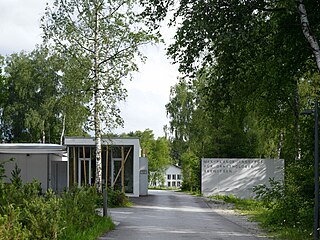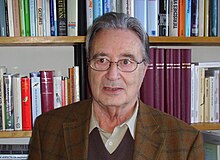
Konrad Zacharias Lorenz was an Austrian zoologist, ethologist, and ornithologist. He shared the 1973 Nobel Prize in Physiology or Medicine with Nikolaas Tinbergen and Karl von Frisch. He is often regarded as one of the founders of modern ethology, the study of animal behavior. He developed an approach that began with an earlier generation, including his teacher Oskar Heinroth.

The Gottfried Wilhelm Leibniz Prize, or Leibniz Prize, is awarded by the German Research Foundation to "exceptional scientists and academics for their outstanding achievements in the field of research". Since 1986, up to ten prizes have been awarded annually to individuals or research groups working at a research institution in Germany or at a German research institution abroad. It is considered the most important research award in Germany.
The former Max Planck Institute for Behavioral Physiology was located in Bulldern, Westphalia, Germany, moved to Seewiesen in 1957. It was one of 80 institutes in the Max Planck Society.
The Max Planck Institute of Neurobiology was a research institute of the Max Planck Society located in Martinsried, a suburb of Munich in Germany. It existed between 1984 and 2022 and merged with the Max Planck Institute for Ornithology to the new, joint Max Planck Institute for Biological Intelligence in 2023.

Erich Walther von Holst was a German behavioral physiologist who was a Baltic German native of Riga, Livonia and was related to historian Hermann Eduard von Holst (1841–1904). In the 1950s he founded the Max Planck Institute for Behavioral Physiology at Seewiesen, Bavaria.

The Max Planck Institute for Innovation and Competition is a Munich, Germany, based research institute, which is part of the Max Planck Society for the Advancement of Science, which manages 84 institutes and research institutions. The institute was formerly known as the Max Planck Institute for Intellectual Property and Competition Law and the name was changed to Max Planck Institute for Innovation and Competition in view of the broader focus of the institute and its interdisciplinary character. The major research areas of the institute are intellectual property, innovation and competition. Apart from providing research support for scholars from across the world, the institute also publishes the International Review of Intellectual Property and Competition Law (IIC).

Walter F. Heiligenberg was a German American scientist best known for his neuroethology work on one of the best neurologically understood behavioral patterns in a vertebrate, Eigenmannia. This weakly electric fish and the neural basis for its jamming avoidance response behavioral process was the main focus of his research, and is fully explored in his 1991 book, "Neural Nets in Electric Fish."

Hubert Simon Markl was a German biologist who also served as president of the Max Planck Society from 1996 to 2002.

Ernst Lecher was an Austrian physicist who, from 1909, was head of the First Institute of Physics in Vienna. He is remembered for developing an apparatus— "Lecher lines"—to measure the wavelength and frequency of electromagnetic waves. He gave his name to the Ernst-Lecher-Institut, a radar research establishment set up in the 1940s in Reichenau, south of Vienna, which is now a part of the German research institute Max Planck Institute.

Irenäus Eibl-Eibesfeldt was an Austrian ethologist in the field of human ethology. In authoring the book which bears that title, he applied ethology to humans by studying them in a perspective more common to volumes studying animal behavior.

Anna Levinson was a German zoologist who specialized in general and applied entomology. She worked at the Max Planck Institute for Behavioral Physiology from 1971, and at the Max Planck Institute for Ornithology from 2004 in Seewiesen and Erling.

Hermann Levinson was a German biologist and physiologist. He lived with his wife Anna Levinson in Starnberg and has worked at the Max Planck Institute for Behavioral Physiology since 1971, and at the Max Planck Institute for Ornithology since 2004, in Seewiesen and Erling.
The Konrad Lorenz Forschungsstelle (KLF) is a research facility in Grünau im Almtal, maintained jointly by private and public entities. The KFL is dedicated mainly to behavioral biology of birds and named after the Nobel laureate Konrad Lorenz, who established the facility in 1973.
The Konrad Lorenz Institute of Ethology is a research institute in Vienna, Austria, dedicated to studying behavioral biology and the links between animal behaviour and conservation. Founded by the animal photographer Otto Koenig and his wife, the illustrator Lilli Koenig as “Biologische Station Wilhelminenberg” in 1945, it was later named after the Nobel laureate Konrad Lorenz and incorporated into the University of Veterinary Medicine Vienna in 2011.
Horst Mittelstaedt was a German biologist and cybernetician. Together with Erich von Holst he demonstrated the "Reafference Principle" in 1950 concerning how an organism is able to separate reafferent (self-generated) sensory stimuli from exafferent sensory stimuli. This concept largely dealt with interactive processes between the central nervous system and its periphery.

Margret Else Schleidt was a German human ethologist. She worked at the Max-Planck-Institut für Verhaltensphysiologie, which has now become the Max-Planck Institute for Ornithology.
The International Max Planck Research School for Organismal Biology founded in 2009, was a structured doctoral program of the former Max Planck Institute for Ornithology in Seewiesen (Pöcking) and the Department of Biology of the University of Konstanz. In October 2010, the first 30 doctoral students began their research, and until 2023, 105 have successfully graduated. The faculty consisted of over 35 leading scientists with a focus on behavioral science, ecology, evolutionary biology, physiology and neurobiology of the former Max Planck Institute for Ornithology and the Department of Biology at the Universität Konstanz. The goal of the IMPRS for Organismal Biology was to provide first-class training and education to doctoral students from around the world, in a stimulating, world-renown research environment. The school officially ended in 2023.

Ethology is a monthly peer-reviewed scientific journal published by John Wiley & Sons. The journal is associated with the Ethologische Gesellschaft and the current editor-in-chief is Wolfgang Goymann. Previous editors-in-chief were Wolfgang Wickler, Michael Taborsky, and Jutta Schneider with Susan Foster.

Wolfgang M. Schleidt is an Austrian scientist specializing in the areas of bioacoustics, communication and classical ethology. He was assistant to Konrad Lorenz, professor of zoology at the University of Maryland (1965–1985) and director at the Konrad Lorenz Institute for Ethology, Vienna of the Austrian Academy of Sciences. He was an early pioneer of bioacoustics and of the quantitative analysis of behavior.

The Max Planck Institute for Ornithology was a non-university research institution under the sponsorship of the Max Planck Society (MPG). As of 1 January 2023, it merged with the Max Planck Institute for Neurobiology (MPIN) to form the new Max Planck Institute for Biological Intelligence (MPI-BI). The MPIO was located in Seewiesen, which belongs to the municipality of Pöcking in Upper Bavaria.














